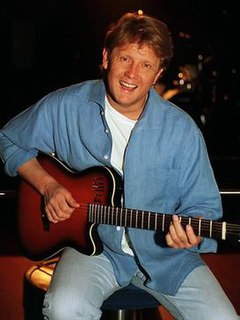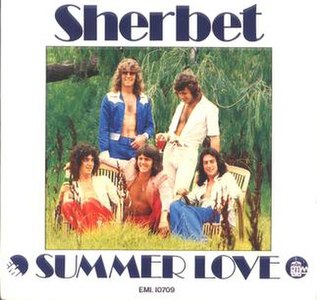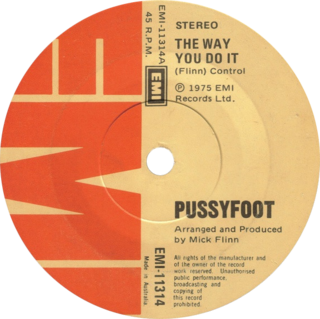
The New Seekers are a British pop group, formed in London in 1969 by Keith Potger after the break-up of his group, The Seekers. The idea was that the New Seekers would appeal to the same market as the original Seekers, but their music would have pop as well as folk influences. They achieved worldwide success in the early 1970s with hits including "I'd Like to Teach the World to Sing", "You Won't Find Another Fool Like Me" and "Beg, Steal or Borrow".
Cheryl Lau Sang, known professionally as Samantha Sang, is an Australian singer. She had an earlier career as a teenage singer under the stage name Cheryl Gray, before adopting the stage name she is more widely known as in 1969. She first received nationwide recognition in Australia in 1967, after releasing the top ten single "You Made Me What I Am".

The Loved Ones were an Australian rock band formed in 1965 in Melbourne following the British Invasion. The line-up of Gavin Anderson on drums, Ian Clyne on organ and piano, Gerry Humphrys on vocals and harmonica, Rob Lovett on guitar and Kim Lynch on bass guitar recorded their early hits. Their signature song, "The Loved One", reached number two on Australian singles charts and was later covered by INXS. In 2001 it was selected as number six on the Australasian Performing Right Association's (APRA) list of Top 30 Australian songs of all time. Their debut album, The Loved Ones' Magic Box, was released late in 1967 and included their other hit singles, "Ever Lovin' Man" and "Sad Dark Eyes". They disbanded in October 1967 and, although the band's main career lasted only two years, they are regarded as one of the most significant Australian bands of the 1960s. They reformed for a short tour in 1987 which provided the album Live on Blueberry Hill. Humphrys lived in London from the mid-1970s until his death on 4 December 2005. On 27 October 2010, the Loved Ones were inducted into the Australian Recording Industry Association (ARIA) Hall of Fame.
Garth Ivan Richard Porter is a New Zealand-born Australian multi-instrumental musician, songwriter and record producer. He was a member, on keyboards and backing vocals, of the pop group, Sherbet (1970–84), and co-wrote both of their number-one singles, "Summer Love" and "Howzat". Porter is a co-writer and producer for country music singer Lee Kernaghan.

Python Lee Jackson were an Australian rock band active from 1965 to 1968, before a brief sojourn in the United Kingdom from late 1968 to mid-1969. The group had recorded a single, "In a Broken Dream", featuring Rod Stewart as guest vocalist in April 1969. The group reformed in 1972 and the single was re-released in August: it peaked at No. 3 on the UK Singles Chart and No. 56 on the United States Billboard Hot 100. The group disbanded again later that year. Their early vocalist, Mal McGee (1966–68) died on 17 May 2012.
The Vibrants were an Australian pop rock group that started as Bobby James and the Vibrants in Adelaide in 1962. James, their lead vocalist, left in 1965 to form the Bobby James Syndicate. As the Vibrants, two of their singles peaked in Go-Set Australian National Charts top 20: their cover versions of "Something About You Baby" and "My Prayer" (September). At the end of 1973the Vibrants disbanded.

Darryl Grant Cotton was an Australian pop, rock singer-songwriter, television presenter and actor. He was a founding member of Australian rock group Zoot in 1965, with Beeb Birtles, and were later joined by Rick Brewer and Rick Springfield. As a solo artist Cotton released the albums, Best Seat in the House (1980), It's Rock 'n' Good Fun (1984) and Let the Children Sing (1994). In April 1980 his biggest solo hit, "Same Old Girl", which was co-written by Cotton, peaked at No. 6 on the Australian Kent Music Report Singles Chart. He acted in the TV soap opera, The Young Doctors (1979), and on stage as Joseph in the theatre production of Joseph and the Amazing Technicolour Dreamcoat (1983). He presented TV shows, Summer Rock and The Early Bird Show. In 1996 he formed Burns Cotton & Morris with fellow 1960s pop singers, Ronnie Burns and Russell Morris. In 2000 Burns retired from the trio and, with Jim Keays, they became Cotton Keays & Morris. In May 2012, Cotton was diagnosed with liver cancer and died on 27 July 2012, aged 62.
Mississippi were an Australian soft rock band (1972–1975), which included Graham Goble on lead vocals and guitar, Beeb Birtles on lead vocals and guitar, and Derek Pellicci on drums. The band had started as Allison Gros in Adelaide in 1970 and moved to Melbourne in 1971 where they recorded as Allison Gros, Drummond and, early in 1972, became Mississippi. As Drummond they issued a cover version of "Daddy Cool", which peaked at No. 1 on the Go-Set National Top 40 for eight weeks. As Mississippi they reached No. 10 with "Kings of the World". In early 1975, with Birtles, Goble and Pellici aboard and the addition of Glenn Shorrock, the group were renamed, Little River Band.

"Summer Love" is a song by Australian pop group, Sherbet and was released in March 1975. It became their first number-one hit on the Australian Kent Music Report Singles Chart. The song was promoted on the newly aired ABC TV pop series, Countdown, which gave it wide exposure. From early 1975 the group made more appearances on the show than any other band in the programme's history. In October, at the King of Pop Awards, "Summer Love" won the Most Popular Australian Single, the band won Most Popular Australian Group and their lead singer, Daryl Braithwaite, won the King of Pop award.
The Mixtures were an Australian rock band that formed in Melbourne in 1965.

Vanda & Young were an Australian songwriting and producing duo composed of Harry Vanda and George Young. They performed as members of 1960s Australian rock group the Easybeats where Vanda was their lead guitarist and backing singer and Young was their rhythm guitarist and backing singer. Vanda & Young co-wrote most of the Easybeats' later hits including their international hit "Friday on My Mind" and they were the record producers for the group from 1967. Young was the older brother of Malcolm and Angus Young of the hard rock band AC/DC and also the record producer behind several of the band's biggest albums. The "Guitar George" and "Harry" who are mentioned in the Dire Straits hit song "Sultans of Swing" are George Young and Harry Vanda.
The Groove was an Australian R&B, pop group which formed in early 1967 with the lineup of Geoff Bridgford on drums, Jamie Byrne on bass guitar, Tweed Harris on keyboards, Rod Stone on guitar and Peter Williams on lead vocals and guitar. In December 1967 their single, "Simon Says", peaked at No. 17 on the Go-Set National Top 40 Singles Chart. They followed with "Soothe Me", which peaked at No. 14 in April 1968. Also in April they released their self-titled debut album. In July that year they won the national final of the Hoadley's Battle of the Sounds competition with the prize including a trip to London. They relocated there in March 1969, and early the following year they changed their name to Eureka Stockade, they disbanded in 1971. On 13 October 2004 Tweed Harris died of throat cancer, aged 63.
Philip John Manning is an Australian blues singer-songwriter and guitarist. Manning has been a member of various groups including Chain and has had a solo career. As a member of Chain, Manning co-wrote their January 1971 single "Black and Blue" which became number one on the Melbourne charts and also Judgement, which reached number two in Sydney. The related album, Toward the Blues followed in September and peaked in the top 10 albums chart.
Donna Jones is an English performer best known for her work as Pussyfoot in the 1970s, and as a member of the New Seekers since February 1979.
Branko Bernard Miler, better known by his stage name Tony Cole, was an Australian singer and songwriter.
The Bootleg Family Band were an Australian folk, R&B and rock band formed in 1973 by Brian Cadd on lead vocals with Geoff Cox on drums, Tony Naylor on lead guitar, Penny Dyer on backing vocals, Gus Fenwick on bass guitar, Brian Fitzgerald on keyboards, Angela Jones on lead and backing vocals, Louise Lincoln on backing vocals and Russell Smith on trumpet. The group became the in-house band for Cadd's label, Bootleg Records. They also released their own material and had chart success with cover versions of "Your Mama Don't Dance" and "The Shoop Shoop Song ", which both reached the top 10 on Australian singles charts. The group toured the United States and performed on the TV shows, The Midnight Special and Don Kirshner's Rock Concert in 1974. Early in the following year they trimmed back to a five-piece line-up as The Bootleg Band. Late that year, Cadd left to work in the US and the remaining members renamed themselves as Avalanche. That group issued a self-titled album in September 1976 and disbanded in 1978. Cadd reassembled the Bootleg Family Band in 2015 to release a studio album, Bulletproof, which was supported by a short tour.
Ronald Stewart Tudor MBE was an Australian music producer, engineer, label owner and record industry executive. He started his career with W&G Records in 1956 as a sales representative; he became their in-house producer and A&R agent before leaving in 1966.
Jigsaw were an Australian country pop band, composed of Jon Calderwood on lead guitar, Eddie Chappell on drums, Ron Gilbee on rhythm guitar and Dennis Tucker on bass guitar. Over the course of their career, the band released Australian top ten singles, "Yellow River" (1970) and "How Do You Do" (1972). They also served as the backing band for Australian singer-songwriter Johnny Chester throughout the early 1970s.
"Ooh Ja Ja" is a song by British recording act Pussyfoot. It was released in Australia in March 1977 as the second single from Pussyfoot's debut studio album, Pussyfootin' Round... With Love. The song peaked at number 20 on the Australian Kent Music Report.

"The Way That You Do It" is a song by British recording act Pussyfoot. It was released in the United Kingdom in June 1975 as their debut single. The song's suggestive lyrics caused it to be banned by the BBC. The song was re-released under the title "Ooh Na Na Hiya" by Donna Jo, the lead singer of Pussyfoot.






